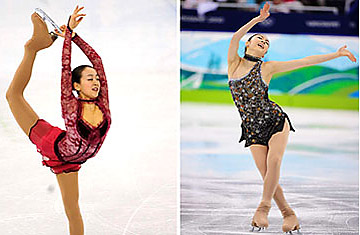
Japanese figure skater Mao Asada, left, and South Korean figure skater Kim Yu-na are competing at the Vancouver Winter Olympics
Sang Kyun Han dragged himself out of bed on Tuesday morning, packed up his cameras, tripod and lenses and lugged all of his equipment to the Pacific Coliseum in Vancouver before the sun rose. A photographer for the Yonhap News Agency in South Korea, Han arrived at 6:40 a.m., hoping for a prime location to shoot pictures of South Korea's gold medal favorite, Kim Yu-na, who wasn't scheduled to compete until that evening. What he wanted was a place just to the right of the judges' table, and he knew he needed to get there early to claim it. That's where Kim would strike the final pose in her short program, set to a medley of James Bond movie soundtracks. Playing the ultimate Bond girl, Kim would bring her hands together into a makeshift gun and point it — Han hoped — straight into his lens.
At least, that was the plan. When Han arrived, however, he was shocked to see that he wasn't the first. In fact, he wasn't even the second or third to walk into the arena at that early hour. A cadre of a dozen or so Japanese photographers, there to shoot their country's gold-medal contender, Mao Asada, had beaten him to it. "I was totally surprised," Han says, lamenting that he didn't get a good position.
That's what the women's Olympic figure-skating competition has come down to: a showdown between two talented young skaters who can each bring the house down with displays of technical skill and artistry — and who each skate with the weight of an entire nation on their tiny shoulders. Kim is the first skater from South Korea with a chance at winning any medal, not to mention gold, in women's figure skating, an event long dominated by the Americans and Europeans. In Seoul on Wednesday morning, businesses and schools stopped as everyone either found a screen to watch Kim's short program live or, as it is a tech-savvy city, turned to their phones to catch her performance. Hits to an Internet provider that was streaming the event live exceeded those during the 2002 World Cup games, which South Korea co-hosted with Japan. At the Seoul Foreign Correspondents' Club, journalists filed en masse to the bar to watch Kim skate, abandoning a lunch at which the former finance minister was about to discuss the G-20 summit, to be held in the city in November. Just as excited, the minister happily joined them.
For Japan, an Asada victory would cement the growing dominance of that country's skating program: the reigning Olympic champion, Shizuka Arakawa, earned the Land of the Rising Sun's first figure-skating gold medal in 2006, and Daisuke Takahashi pumped out an energetic and technically demanding performance last week to win the country's first men's medal ever, a bronze.
The South Korea–Japan rivalry is a given in sports like soccer and baseball, in which victory is a matter of national pride. But it's relatively new in figure skating. Apparently, though, the same rules apply. In the media room of the Pacific Coliseum, the South Korean press occupies one table, while the Japanese media occupies another, like contending military encampments. Indeed, the rivalry is all the more intriguing because of history — an uneasy legacy of the days when Japan occupied Korea and in the eyes of some Koreans, attempted to quash their culture and identity. The continuing tug-of-war over the ownership of the Dokdo Islands (which the Japanese call Takeshima) was just the most recent demonstration that animosity between the two nations continues to run deep. "There's more emotion to [the skating competition] because it brings back the past," says Wendy Park, a precocious 15-year-old South Korean from Vancouver who came with her mother to watch Kim compete in the short program, joining the throng of flag-waving South Korean fans. "Sports is where it shows up; it's not a nice part of it, but it is a part of any competition between Korea and Japan." But, she added, speaking like a true teen, "That's what makes it exciting."
